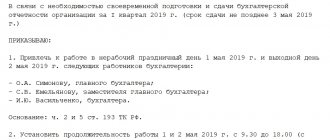Home/Time off/For previously worked time
There has been a situation in everyone's life when, for some reason, he had to stay late at work: on his own initiative or at the request of his manager, or to go out on his day off. And although, by law, overtime must be paid, this does not always happen - in this case, every employee should be aware of his right to time off for previously worked time.
For your information
Time off is an opportunity to take an extra free day during the work week and spend it usefully: go on personal business or just relax with your family. Read more about this opportunity and how to apply it correctly in this article.
Labor Code of the Russian Federation
Employees have the opportunity to take time off for previously worked time:
- Who went to work on Saturday or Sunday.
- Worked on official holidays.
- We stayed late at work at the request of our manager. If the delay occurred on the initiative of the employee, the likelihood of realizing this opportunity is low.
- Who worked on days that were days off for them at an enterprise with a 24-hour or daily operating schedule.
It is also worth remembering that in the Labor Code of the Russian Federation there is no such thing as time off. It is used only in colloquial speech, but is absent from the official and legal sides. Instead, the Labor Code of the Russian Federation has another concept - a day of rest. This is stated in Article 153 of the Labor Code of the Russian Federation.
For your information
A day of rest is more of a compromise solution. If a person goes to work on a non-working day, he is required to pay him. But, from the employer’s point of view, providing an additional free day is much simpler and more convenient - in this case, the working day and the day off for previously worked hours are simply swapped.
Article 153 talks about the standards of remuneration during non-working hours - every employee who decides to take so-called time off must be familiar with it.
If an employee chooses time off for working on a weekend, is he paid for this day of rest?
If you conduct a survey among employers about how they understand the procedure for remunerating an employee who takes time off for working on a day off, the answers will be very diverse. Although, it would seem, in Article 153 of the Labor Code of the Russian Federation it is written in black and white “a day of rest is not subject to payment.”
In this regard, I will provide an excerpt from the Recommendations of the Federal Service for Labor and Employment on compliance with labor laws governing the procedure for providing employees with non-working holidays (approved at a meeting of the working group on informing and consulting workers and employers on compliance with labor laws and regulations , containing labor law norms, protocol No. 1, dated 06/02/2014):
“The rules for remuneration on non-working holidays are established by Article 153 of the Labor Code of the Russian Federation.
In accordance with part one of this article, work on a non-working holiday is paid at least double the amount:
for piece workers - no less than double piece rates;
employees whose work is paid at daily and hourly tariff rates - in the amount of at least double the daily or hourly tariff rate;
for employees receiving a salary (official salary) - in the amount of at least a single daily or hourly rate (part of the salary (official salary) for a day or hour of work) in excess of the salary (official salary), if work on a day off or a non-working holiday was carried out within monthly standard working time, and in an amount of at least double the daily or hourly rate (part of the salary (official salary) for a day or hour of work) in excess of the salary (official salary), if the work was performed in excess of the monthly standard working time.
Specific amounts of payment for work on a day off or a non-working holiday can be established by a collective agreement, a local regulatory act adopted taking into account the opinion of the representative body of workers, or an employment contract (part two of Article 153 of the Labor Code of the Russian Federation).
Thus, the Labor Code of the Russian Federation establishes minimum guarantees for wages on non-working holidays, which can be increased through contractual or local regulation.
In addition to increased pay, work on a non-working holiday can be compensated by providing another day of rest. However, this is only possible at the request of the employee, i.e. the employer does not have the right, without the employee’s consent, to provide him with a day of rest instead of increased pay. In this case, work on a weekend or a non-working holiday is paid in a single amount, and a day of rest is not subject to payment (part three of Article 153 of the Labor Code of the Russian Federation).
Paying a day off at a single rate means that a salaried employee is paid a single daily rate in addition to his salary. Wages (salary) in the month when a day of rest is used is not reduced. It does not matter whether the employee takes a day of rest in the current month or in subsequent months.”
Courts generally interpret this norm of the Labor Code of the Russian Federation in a similar way as indicated in the above-mentioned Recommendations. That is, the point is that this additional day of rest (or an individual day off for a specific employee) is not subject to additional payment above the salary in the month in which it was used by the employee. Moreover, the employee can use it at any time in agreement with the employer. That is, with this interpretation, a certain balance of interests of the employer and employee is maintained, and, at the same time, this allows the employee to actually make a choice between double pay for work on a day off and a day off that will not reduce his salary in the month when the employee took it.
However, many employers believe that an employee who goes to work on a day off can take a day off, but in the month when he took the day off, his salary will decrease, since this day is not paid (if a literal reading of Article 153 of the Labor Code RF)…
I believe that such an opinion clearly pushes the employee to always make a choice in favor of double pay. What will be the opinions?
How to write time off for previously worked time?
Article 153 of the Labor Code of the Russian Federation states that another day of rest can be provided only at the request of the employee - that is, no one can oblige him to this. The choice: another day off, or the monetary compensation is not paid by the employer.
If the decision is nevertheless made in favor of time off, it is important to follow three rules:
- You can choose only one type of compensation: money or a free day; it is impossible to demand both;
- According to the law, it is impossible to apply this sequence in practice: first not coming to work, and then working. You can only rest for the time that was devoted to work earlier;
- The employee is obliged to notify his superiors of his desire. It is impossible to not go to work and then formalize it - in this case, absence from work will be perceived as absenteeism.
Attention
If you want to take advantage of the right to time off, you must notify your superiors in advance and this must only be done in writing - a verbal agreement in this case is invalid.
The application should be submitted a few days before the desired day off, especially if it requires adjustments to the current work schedule. Only after the employer reads it and signs it, the day indicated in it will be considered a day off.
Double pay for time off
If the management of a company or enterprise engages an employee to work urgently on his legal day off, then, according to Labor Law, he is entitled to be paid double the average monthly salary.
In addition, he has the right to choose between:
- Double pay for his work.
- Or single, but with an additional day of rest.
This technique is also applicable if he is involved in work at the end of the work shift, in other words, overtime work. He can be paid either double or one and a half times the average monthly salary at the discretion of management.
Usually, such a continuation of the work shift is involved in only a few hours, but in order to be paid in full, these hours are summed up to the amount of time in the work shift, and I provide compensation in the form of time off.
Save
Application for time off
It is very simple to write an application for time off for previously worked time - the application form is standard. But, it is important not to forget that such a concept as “time off”, as mentioned above, does not exist in the legislation. That is why the application is written not for time off, but for an additional day off on account of previously worked time.
The application can be either handwritten or printed using a standard form used by the company. If there is none, here is a simple reminder:
- In the “header”, that is, in the upper right corner, it is necessary to indicate whose name is written, and then from whom, indicating the surname, initials of the name and patronymic, as well as the position held;
- Below, in the middle of the sheet, the word “Statement” is written in large letters;
- After that there is the main text: “Please provide me with a day off (the desired date is indicated) for the early hours worked (date of return to work)”;
- The employee's signature and date are placed in the lower right corner.
How to take time off
The procedure for granting time off implies the correct registration of time off on a non-working day, because The possibility of an additional day off depends on the availability of supporting documents. When the need arises to involve people in recycling, the algorithm of actions is as follows:
- An order or memo is issued indicating the dates and describing the reasons for overtime work.
- To obtain the consent of employees, they are given written notices about upcoming work on a day off, where compensation options are indicated (a day of rest or double pay). There must be a line about the right to refuse overtime.
- Employees sign notices indicating the chosen method of reimbursement.
- An order for overtime work is issued with a list of employees involved and an indication of the method of compensation they have chosen.
If additional rest is chosen, the person not only indicates this in the notification, but also sets the date when he plans to take advantage of it. After this, it is recommended to write a statement.
Having received the application, the manager prepares an order to grant time off for working on a day off. This is displayed in the working time sheet, and if overtime and a day off for it were in the same month, the time standards do not change and the employee receives a full salary for this period.
You may be interested : Work on weekends and holidays according to the Labor Code
Labor legislation defines categories of citizens who are not recommended to be involved in work beyond the schedule: these are disabled people, pregnant women, minors and mothers with children under 3 years of age. It is mandatory to obtain from them a written consent to go out during non-working hours, certified by a signature, while giving them the right to refuse. To avoid conflict situations, it is recommended to request a medical opinion from them that does not prohibit additional workload.
Samples of application and order
The application for time off must indicate the date of the desired rest and specify which day of overtime it will compensate for. applications can be found here.
IMPORTANT! You cannot take time off without an application: the day of rest must be agreed upon in advance with management. It is allowed to combine accumulated days off and take them in a row in the form of a short vacation.
An order is the basis for making changes to the working time sheet and the progress of payroll calculation. It legally releases a person from work duties for the required period. A sample order for granting time off is available for download here.
Thanks to these measures to protect the rights of employees, people can count not only on basic labor remuneration, but also on compensation for overtime. The main condition is the correct and timely execution of documents.
Procedure for provision
After the application is signed, the manager issues an order and gives it to the employee for review. As soon as the latter signs, his request is considered valid.
You also need to know: if an employee needs an additional day off, he does not have to work overtime to provide it - there are two other ways to get another day off, or even several, when you can solve all your business:
- Take a day off as paid vacation;
- Take a vacation at your own expense.
Let's take a closer look at these two options:
Time off towards vacation
After six months of work in the company, each employee is given 28 days of paid leave. You can use them either by using them all at once or by dividing them into several parts. The only rule that is important to follow in this case is to go on vacation once for at least 14 days. The remaining time can be used as you please.
To do this, you need to write a statement about your desire to take extraordinary paid leave, indicate from what date and for how many days. You can use it one day or take it for several days in a row.
Vacation at your own expense
If there are no vacation days left, or another six months have not passed since the date of registration with the company, you have the opportunity to take a vacation at your own expense at any time. It will not be paid - the salary will be deducted from the rate for those days that the person was absent.
The application is written in the same form, only the following must be written as the main text: “I ask you to grant me leave without pay from (indicate the start date of the leave) for (number of days) for the reason (indicate it).” Most often, the reason is simply “family reasons.”
The decision to provide leave at his own expense always remains with the employer. If an employee does not have a good reason why he cannot come to work, he may be denied time off.
There are only three reasons why leave without pay is mandatory:
- wedding;
- birth of a child;
- death of a relative.
Sometimes it is necessary to provide a document confirming the veracity of the reason specified in the application.
Labor Code on time off
The main aspects related to the relationship between employee and employer are enshrined in the employment agreement. It specifies the work and rest schedule, the principle of wage formation, and the responsibility of the parties for violating the provisions of the contract. In rare cases, the document contains information about granting time off; therefore, for clarification, it is worth contacting the legislation directly.
A number of categories of citizens have the right to receive an additional day off, as well as all others in the presence of significant circumstances. To ensure that absence from work is not classified as a violation of discipline, it is necessary to notify management in advance and obtain permission. Let's consider the grounds for granting time off according to Russian legislation:
- against previously spent time;
- donation;
- as part of a vacation;
- time off at your own expense.

In modern legislation there is no term “time off”, but it is used in informal communication. In the company's regulatory documents, failure to appear is recorded as a day off or vacation, depending on the basis for the provision. According to the Labor Code of the Russian Federation, time off for previously worked time is an additional day of rest that compensates for overtime.
What the law says

Time off for previously worked time is provided to the employee based on his application. If the authorities approve it, an order is issued. Issues related to overtime hours are taken into account in paragraphs 152-153 of the current Labor Code.
There are rules according to which an employee is paid for additional work. But they are also established in accordance with the instructions of Article 152 of the Labor Code of the Russian Federation.
- For the first two hours, overtime pay increases 1.5 times, and for the rest of the time worked, the payment is doubled.
- The amount of monetary compensation can be negotiated based on the provisions of the contract. The nuances and conditions for calculating compensation can be taken into account in the employment agreement.
- Additional rest days are measured according to hours worked.
Each employee chooses the type of compensation himself. This right is granted on the basis of the instructions of the Labor Code, so the employer does not have the opportunity to determine this independently.
Important: when a task needs to be completed, the employer negotiates with the employee the type of compensation. There is only one type of compensation for overtime hours.
There are also restrictions on performing production tasks - for example, you cannot be involved in them on holidays and weekends:
- workers under 18 years of age;
- pregnant women and with children under three years of age.
These rules are indicated in the Labor Code, in articles 113, 268.
Reasons for receiving
The process of applying for required time off involves first of all establishing the grounds for this. The most common reasons for receiving an additional day of rest are the following situations:
- the employee performs labor functions in good faith and in excess of established duties;
- overtime recorded in the report card;
- work on weekends and holidays;
- funeral of a close relative, serious illness;
- employee participation in the donor program;
- the need for rest due to overload at work, including emotional;
- undergoing a medical examination;
- obtaining education in parallel with work;
- business trip affecting legal rest days;
- urgent need caused by events such as a wedding, the birth of a child, a summons to a court hearing and other circumstances.
Despite the protection of the legislator, in most cases an employee has to rely only on the employer and his loyalty. In addition, a particular enterprise may have local regulations regulating the issue of receiving time off.
Speaking about specific provisions of the Labor Code of the Russian Federation, we can define several categories of persons who receive time off, regardless of whether the manager agrees to it or not. For example, in accordance with Article 128 of this law, WWII veterans can receive 35 days of compensatory leave per year.
Mandatory time off
The application of the procedure for granting an employee time off requires an assessment of the circumstances giving the right to this. To simplify the procedure, the Labor Code of the Russian Federation provides the following provisions:
- Article 128 of the Labor Code of the Russian Federation. Provides time off for pensioners (14 days per year), parents and spouses of military personnel who died as a result of their duties, disabled people (60 days per year), participants in the Great Patriotic War (35 days per year), also the basis may be a wedding, funeral and childbirth (up to 5 days per year).
- Article 173-173.1, 174 of the Labor Code of the Russian Federation. The right to time off has been established for university and college students for a period of 10 days to 4 months. Provided if necessary to pass entrance exams, intermediate and final certification, or defend dissertations.
- Article 262 of the Labor Code of the Russian Federation. An additional day off is provided for women working in rural areas (1 day per month).
- Article 263 of the Labor Code of the Russian Federation. Establishes the right of parents raising two or more children under 14 years of age, or a disabled child under the age of eighteen, as well as single mothers and fathers with a child under 14 years of age. Number of days off – 14 per year.
- Article 286 of the Labor Code of the Russian Federation. There is a procedure for providing additional days of rest to an external part-time worker if the vacation at the main job is longer. The number of days is determined taking into account the vacation period.
- Article 319 of the Labor Code of the Russian Federation. Establishes one day off per month for persons who work in the Far North and are raising a minor child (under 16 years old).
The above cases do not imply refusal on the part of management. In other situations allowing time off, the employer's consent will be required.
When can you use time off?
To confirm the employee’s desire (in case of a dispute), it is better to ask the employee to state his desire in writing.
The terms and procedure for granting time off for working on a weekend are not defined in the Labor Code.
Do I need to count hours off for time off?
When using the wording “day of rest” in the Labor Code, from the point of view of the Federal Service for Labor and Employment, the legislator meant precisely the “day” of rest.
Therefore, regardless of the number of hours worked on a day off, the employee is given a full day of rest (letter of the Federal Service for Labor and Employment dated March 17, 2010 N 731-6-1).
Please note that an employee going on a business trip on a day off, according to the Supreme Court of the Russian Federation, should be considered as work on a day off (decision of the Supreme Court of the Russian Federation dated June 20, 2002 N GKPI2002-663). A similar approach should be applied to the situation when an employee returns from a business trip on his day off.
The time worked by each employee is recorded using forms N T-12 or N T-13. When filling out Form N T-13, the day of rest provided for work on a weekend or non-working holiday is reflected as follows: in the upper lines of column 4 opposite the employee’s last name, enter the alphabetic (НВ) or numeric (28) code, and leave the bottom line blank .
Registration of the provision of a day of rest is directly related to registration of employment on weekends and non-working holidays.
Before formalizing the provision of a day of rest, it is necessary to make sure that the involvement in work on a day off (non-working holiday) was carried out with the consent of the employee by order of the employer indicating the compensation chosen by the employee.
If you were hired to work on a day off (non-working holiday) in accordance with the law, you can begin to formalize the provision of a day of rest.
The procedure for providing a day of rest for worked weekends (non-working holidays) may be as follows:
- Receive an employee’s application for a day of rest indicating the date of the day of rest.
- Issue an order to provide a day of rest.
- Familiarize the employee with the order against signature.
- Take into account the day of rest in the time sheet.
How is time off paid for time previously worked?
If an employee decides to choose an additional day off instead of paying for overtime, he will not be paid, as mentioned above. The employee will receive money only for the days worked: that is, for the time that he went out or stayed extra. Roughly speaking, the days are simply swapped; this does not affect payment in any way.
In the case where the time off was taken as vacation pay, payment for it is made in accordance with the vacation pay that will be accrued. In accounting, special formulas are used for this.
Days off taken at your own expense are not paid. The employee himself takes responsibility for this.
Deadlines
The Russian Labor Code does not say when a person should use time off for previously worked time - the choice is completely left to him. In fact, you can use it several months after unscheduled working hours or days.
The only exception to this can be the case if the deadlines for their provision are stipulated in the internal regulations of the company, with which the employee was familiarized with when hired, or to which he signed, if the regulations were updated during the work process.
The number of days or hours of leave is directly proportional to the number of days or hours during which the employee was present at the workplace.
Is registration required?
If the relationship between an employee and an employer is trusting, they sometimes “agree verbally” and swap working days and weekends without drawing up official papers.
Such irresponsible behavior is contrary to the Labor Code. Moreover, it also creates additional difficulties in accounting. When calculating the required payments, the employee’s working day and day off, and the increase in pay may not be taken into account. And all because the corresponding application and order for time off for previously worked time was not issued. Both the personnel officer and the accountant must have legal grounds in the form of primary documents for the proper execution of their payments and payments. In addition, there is a risk here for both the employer and the employee.
After all, according to the law, responsibility for the safety of an employee in the workplace lies with the employer. And if an employee injures himself on a given day off and does not document this, then this will be considered a work-related injury.
As for the storage period, the order for time off for previously worked time relates to personnel documentation and is stored for 5 years (if the employee does not have to deal with difficult and harmful working conditions).
Time off for previously worked time in the report card
The work process, taking into account weekends, vacation days, absenteeism and business trips, is recorded in a special table - a working time sheet. This is the main document used in accounting to calculate payroll. That is why the accuracy of the reflection of real data for drawing up a report card is very important.
In the table, each concept has its own designation:
- If an employee has been granted time off, this is reflected in the report card with the letters “OV”;
- In the case where additional days off were taken on account of paid leave, “FROM” is indicated;
- If the employee took several days at his own expense, the letters “TO” are entered in the timesheet.









